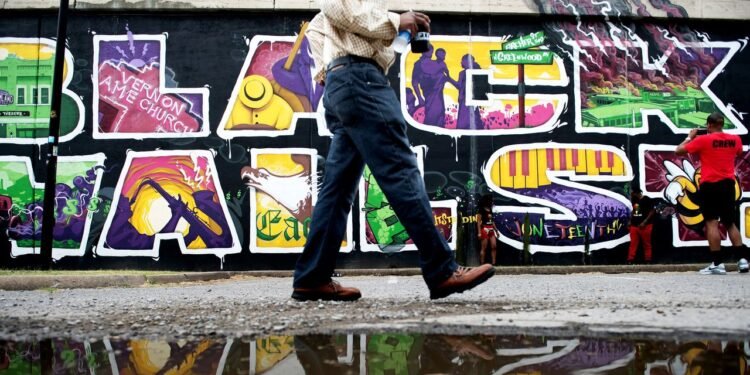What I discovered in Tulsa was that the Heartland encompasses the great middle of the country—not only in geographic terms but in societal, cultural, and even spiritual ones. For me, the Heartland represents midsize cities like Tulsa, middle-class citizens, and those striving to reach the middle class. “Whether the mythical heartland is celebrated or reviled,” historian Kristin L. Hoganson writes, “it fosters the perception that there is a gulf between the center and the edges, between the heart and the national body.” No matter its definition or borders, this perception is real: the Heartland does, indeed, represent a divide. We typically think of people lacking opportunities as marginalized, operating on the edges of society. But the Heartland rightly shows us that the metaphor is inverted—those on the margins of economic opportunity represent the vast middle, while coastal tech hubs, through their concentrated wealth, are in the minority and yet firmly in power.
Every city wants to become a tech hub, but only a handful on the coasts rule America’s innovation system—and that’s a problem. The Brookings Institution found that between 2005 and 2017, 90 percent of growth from the country’s innovation sector came from just five coastal metros. And from July 2022 through July 2023, six coastal cities accounted for almost 50 percent of all US job postings in generative artificial intelligence (AI), which is the cutting edge of today’s tech industry. Through the clustering of talent, industry, and capital and the agglomeration economics that result, big coastal cities like New York, San Francisco, Los Angeles, Seattle, Boston, and Washington, DC, have monopolized innovation and its myriad benefits. This narrow geographic distribution of the innovation economy leaves Heartland cities out and restricts opportunities for most of the population.
Consequently, the American Dream—the notion that through hard work everyone has an equal opportunity to lead a good and decent life so that successive generations are better off—is moving further out of reach for more people. In 2023, citing rising income inequality, the Harvard economist Raj Chetty said, “If we look at what has happened over time, we see a dramatic fading of the American Dream such that for children born in the middle of the 1980s and the 1990s who are entering the labor market today, it’s now become a coin flip, a 50-50 shot, as to whether you’re going to do better than your parents.” These are unacceptable odds that undermine faith in American democracy and capitalism, and they’re only going to get worse unless Heartland cities act with urgency to reset their economies.
Heartland cities like Tulsa can and must be actors in the innovation economy, which, despite its inequitable access, remains the best opportunity for long-term job and wealth creation. But they don’t need to compete with the big coastal hubs. Middleweights are in a class of their own, and they should strive to become the best version of themselves.
Midsize cities like Tulsa, with metropolitan statistical area populations between 1 and 3 million people, already have the foundation to support a tech ecosystem: population density, cultural amenities, as well as a relatively low cost of living that can de-risk entrepreneurship. Pandemic workforce trends have highlighted these advantages, as members of the creative class can now more easily search for a better quality of life and move away from coastal cities, where growth and equity too often work in opposition. Established tech hubs are driving out even the well compensated, and this cohort of mobile talent is finding benefits in unassuming places like Tulsa. This influx of talent creates an opportunity for any city that can attract and retain them.
Despite possessing many of the key elements for a tech eco system, too many Heartland cities have also shut themselves out of the innovation economy by clinging to outdated notions of economic development, by underinvesting in their communities, or by holding on to a nostalgic sense of culture—an aversion to change that has led to counterproductive policies that turn off outside tech talent and investors and do nothing to foster home grown ecosystems. While most change happens organically over time, skyrocketing domestic inequality and widening geographic disparities in tech have brought us to an inflection point as a country. Heartland cities need to pivot with intention and haste—or risk dying out.
Taken from Reinventing the Heartland by Nicholas Lalla Copyright © 2025 by Nicholas Lalla. Used by permission of Harper Horizon, a division of HarperCollins Focus, LLC.









